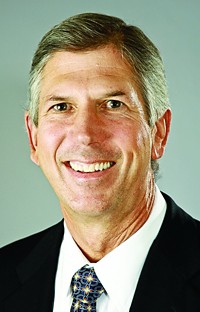Advertisement
Grab your lab coat. Let's get started
Welcome!
Welcome!
Create an account below to get 6 C&EN articles per month, receive newsletters and more - all free.
It seems this is your first time logging in online. Please enter the following information to continue.
As an ACS member you automatically get access to this site. All we need is few more details to create your reading experience.
Not you? Sign in with a different account.
Not you? Sign in with a different account.
ERROR 1
ERROR 1
ERROR 2
ERROR 2
ERROR 2
ERROR 2
ERROR 2
Password and Confirm password must match.
If you have an ACS member number, please enter it here so we can link this account to your membership. (optional)
ERROR 2
ACS values your privacy. By submitting your information, you are gaining access to C&EN and subscribing to our weekly newsletter. We use the information you provide to make your reading experience better, and we will never sell your data to third party members.
Business
A New Approach
Chemical industry association shifts to internet for communication
by Michael McCoy
June 22, 2009
| A version of this story appeared in
Volume 87, Issue 25

The American Chemistry Council is changing how it interacts with the larger world. Out is the essential2 advertising campaign that has appeared widely in magazines and on television in recent years. In is a more targeted approach involving blogs, Facebook, and Twitter.
That was one of the messages that came out of ACC's annual meeting, held earlier this month at the Broadmoor resort, in Colorado Springs, Colo. Somewhat sparsely attended, the event was held during the darkest economic time in memory for most of the executives there. "The world has changed since the last meeting," said J. Brian Ferguson, chairman of Eastman Chemical and incoming chairman of the association's executive committee.
The new communications strategy at ACC, the U.S. chemical industry's main trade association, is part of a shift away from a broad engagement with the public to a more focused outreach approach centered on issues advocacy.
Calvin M. Dooley, ACC's chief executive officer, told reporters at a press briefing that essential2 did its job of communicating the industry's role in ensuring society's well-being. "We will still deliver a message of the contributions our industry makes," he said, "but we will target it to complement our policy agenda."
Pointing to industry trends, Ferguson added that fewer companies making fewer dollars means ACC doesn't have the resources to pursue every initiative it would like to pursue. "When urgent and important clash, nine out of 10 times urgent wins out," he said. In this case, the urgent issues are reform of the Toxic Substances Control Act, climate-change legislation, railroad policy reform, plant security, and the tax implications of the federal budget.
One chemical company CEO, speaking on the grounds of anonymity, said essential2 had always been opposed by a small but influential group of ACC members who doubted its ability to change public perception of the industry. Indeed, after an initial upward blip, polling since the campaign's 2005 launch showed the industry's favorability with the public to be slipping. Meanwhile, the campaign's $20 million-per-year price tag was making it hard to sell to struggling member companies.
In its place is an Internet-based program that Lisa B. Harrison, ACC's vice president of communications, said will cost closer to $12 million per year. It will be coordinated by Racepoint Group, a recently hired public relations agency in Waltham, Mass.
Randall S. Dearth, U.S. head of chemical maker Lanxess and chairman of ACC's communications committee, told reporters that the new program will allow the association to better engage its constituents and react more quickly to broadsides on its products.
Dearth pointed to the case of bisphenol A (BPA), an intermediate used to make polycarbonate and epoxy resins. BPA is being attacked by environmental activists as an endocrine disrupter that can leach out of baby bottles and metal can liners. ACC contends that the extremely small amounts of BPA people might come in contact with are safe.
"We understand the science, but they still beat us to the punch," Dearth said of BPA opponents. The idea is that blogs and Facebook postings will allow the industry to confront its critics in the arena in which they operate and to employ constructive engagement rather than one-way press releases.
One part of the plan, Dearth said, is to create "digital buses" that are at the ready with information about chemicals that might come under fire. Just like real-world buses that roll into town full of advocates for a cause, these digital buses can be sent out rapidly to legislators and congressional staffers. "The average age of a staffer in Washington is 31," Dearth noted. "They are getting their information online."
ACC officials admitted that online communities such as YouTube and Twitter are uncharted territory for the organization. Dearth himself has started a Facebook page where he posts on topics such as his son's soccer team; Pittsburgh, where he is based; and the chemical industry. "Our lawyers are not 100% aboard," Dearth acknowledged, because he posts updates about Lanxess without submitting them for internal review.
Still, ACC is encouraged by a plastics recycling blog called "Too Valuable to Waste" that the association hosted during the month of May. Participants ranged from chemical company managers to environmentalists to eccentric recycling enthusiasts. "There were people who took us on," Harrison said, "but that's okay." In fact, she noted, it was other bloggers, rather than ACC, who came to the industry's defense.
At any rate, Dearth observed, the new social networking tools are likely here to stay. He recalls a 1994 debate at Bayer, Lanxess' predecessor company, about whether to launch a website. Executives decided against it because they didn't see any business opportunity.
"We're hearing the same things now about Twitter and Facebook," Dearth noted. ACC has an opportunity to influence the debate about its products and needs to grab it, he said. "If you don't create who you are," Dearth said, "someone else will."




Join the conversation
Contact the reporter
Submit a Letter to the Editor for publication
Engage with us on Twitter